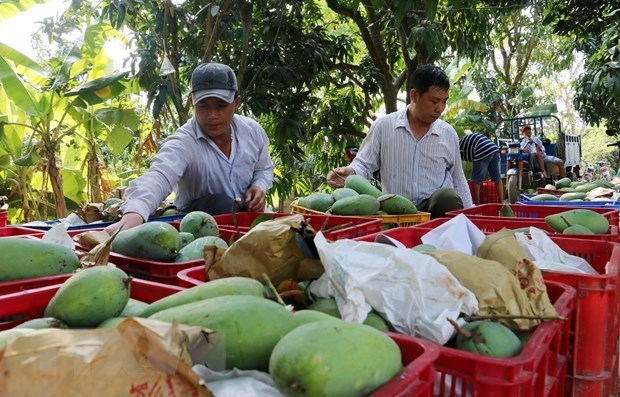
The Ministry of Agriculture and Rural Development (MARD) expects that, by 2030, Vietnam will be home to about 140,000 ha of mango trees with output standing at 1.5 million tonnes, earning the country US$650 million from exports of the fruit.

The mango growing area currently stands at some 87,000 ha, 48% of which is in the Mekong Delta.
Vietnam shipped over US$180 million worth of mangoes abroad last year, accounting for only 1.15% of the world’s total.
China was the largest market of Vietnam, with nearly US$152 million, or 83.9% of the total, followed by Russia, the US, the Republic of Korea, the EU, Australia, and Japan, according to MARD’s Agro Processing and Market Development Authority.
To achieve the export target, Deputy Director of MARD’s Plant Protection Department Nguyen Thi Thu Huong called on the ministry to upgrade her department’s technical centres so as to carry out studies helping to remove technical barriers, seek new markets, and conduct pre-export checks.
She also recommended MARD digitalise its databases on farming zones, processing establishments, and packaging facilities.
While localities should enhance connectivity between cultivation areas and increase training for local staff in charge of farming techniques, businesses need to seriously comply with regulations from both importing countries and Vietnam, boost production cooperation, maintain constant monitoring to ensure sufficient supply and quality materials, and remain updated on export information, Huong added.
Deputy Minister Tran Thanh Nam said having 48% of the mango growing area concentrated in the Mekong Delta is favourable in improving quality and meeting the requirements of importing markets.
However, as the area meeting VietGAP and GlobalGAP standards makes up just 3.8% of the Mekong Delta’s mango growing area, it is necessary to boost the adoption of these standards, he noted.
Nam also urged provinces and cities in the Mekong Delta to work to improve quality in every step, from farming and harvesting to preservation, while strengthening links in mango sales.
In particular, they should identify target markets and work with enterprises and cooperatives to help farmers align cultivation practices with international standards.
Bình luận
Bình luận của bạn sẽ được xét duyệt trước khi đăng